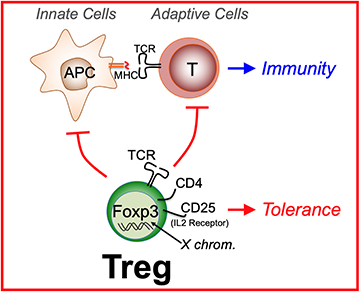Immune Regulation & Tregs

Tregs are a subset of immunosuppressive CD4+ T cells that play an essential role in preventing autoimmunity, but Tregs infiltrate most tumors and dampen anti-tumor immune responses. Natural reprogramming of Tregs has been observed in several auto-inflammatory contexts, but as a cancer therapy, it stands to be incredibly powerful, as it can both subvert immune tolerance, by removing immunosuppressive cells from tumors, and directly boost anti-tumor immunity, by converting immunosuppressive cells into immunostimulatory ones. My research has revealed how key extracellular cues sensed in the microenvironment impinge on Treg homeostasis. By combining sophisticated genetic techniques, genomic analyses, and single cell assays to interrogate immune regulation in the settings of cancer and autoimmunity, my research identified a method to reprogram Tregs to fight cancer. I have uncovered an epigenetic switch – via Enhancer of Zeste homolog 2 (Ezh2)-mediated regulation of H3K27me3 chromatin modifications – that is activated by a critical environmental sensor in Tregs (the CD28 receptor) and whose activity can selectively reprogram the function of Tregs in tumors without inducing systemic autoimmunity. In addition, my work has demonstrated that stable Tregs require PTEN-mediated regulation of the PI3K/Akt signaling pathway, a pathway activated by sensing the cytokine IL-2, which is paradoxically essential for maintaining Treg function. The overarching goal of my research is to identify and characterize mechanisms whereby diverse microenvironments act on intracellular pathways that govern Treg function, and target these pathways to selectively enhance the immune response against cancer and ameliorate autoimmunity with heightened precision.
PUBLICATIONS:
-
Huynh A, DuPage M, Priyadharshini B, Sage PT, Quiros J, Borges CM, Townamchai N, Gerriets VA, Rathmell JC, Sharpe AH, Bluestone JA, Turka LA. Control of PI(3) kinase in Treg cells maintains homeostasis and lineage stability. Nat Immunol(2015) 16: 188-96.
-
DuPage M, Chopra G, Quiros J, Rosenthal WL, Morar MM, Holohan D, Zhang R, Turka L, Marson A, Bluestone JA. The chromatin-modifying enzyme Ezh2 is critical for the maintenance of regulatory T cell identity after activation. Immunity(2015) 42: 227-238.
-
DuPage M, Bluestone JA. Harnessing the plasticity of CD4+ T cells to treat immune-mediated disease. Nat Rev Immunol (2016) 16: 149-163.
-
Wang DQ, Quiros J, Mahuron K, Pai CS, Ranzani V, Young A, Silveria S, Harwin T, Abnousian A, Pagani M, Rosenblum MD, Van Gool F, FongL, BluestoneJA, DuPage M. Targeting EZH2 reprograms intratumoral regulatory T cells to enhance cancer immunity.Cell Rep (2018) 23: 3262-3274.



